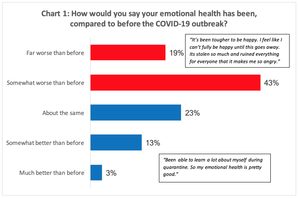How are Oakland students fairing, returning to school after a year of isolation? What guidance is OSA offering to students at this time? --Cb omand, 6 grade

Throughout COVID-19 cases of depression, anxiety and so much more have skyrocketed with students. The Jedfoundation did a survey on college kids in October of 2020 which reported that “A combined 63% of students say that their emotional health is worse than before the COVID-19 pandemic.” How are Oakland students fairing, returning to school after a year of isolation? What guidance is OSA offering to students at this time?
As students return to school, many are finding that they’re dealing with higher stress levels. According to the same JedFoundation survey, “30% of students are turning to counseling, 48% are turning to a support system of friends, and 39% are turning to a support system of family.”
Lily Brown is a 6th grade student at Head Royce in Oakland. “Yes, I do feel like I get a lot more stressed and emotional,” she says. Brown has been back to school since August 23rd. She feels like her levels of stress have been rising. She also said she was starting to find symptoms of OCD in her everyday life. In addition, she said that she is wanting to see someone about this.
I also spoke with Audrey Omand, a 10th grader at Bishop O’dowd High School. “Yes, I have had concerns about mental health before Covid,” she says. Omand believes that Covid has made her concerns with social anxiety worse. “With me not being outside a lot during isolation, I now don’t feel the need or want to be outside and socializing, and I know that's not good for me.”
As you can see, age groups across the board are facing many of the same challenges. Both are dealing with having lived in isolation differently, however they’re not sure about their next steps. Brown is looking at finding someone to talk to while Omand is not concerned with the topic.
Even though we are still in a pandemic there are still ways to get help.
Erica Wandner, a school counselor at OSA says to “Find some teachers that you trust, find at least two trusted adults at school.” It is also a good idea to have a support system at home. Really any trusted adult that you can get in contact with.
If you can’t get in contact with a trusted adult, the National Suicide Prevention Lifeline is available 24 hours a day, 7 days a week at 1-800-273-8255, or in crisis, text TALK to 741-741. If you're not in a crisis and just feeling a little blue, go outside or take a walk.
Apa.org states “If you've ever gone for a run after a stressful day, chances are you felt better afterward.” The reason for this is when exercising your brain releases dopamine and serotonin which are natural happy chemicals.
It's ok to not be ok. If everyone was happy all the time it would be a little scary. The reason why we have feelings is to feel them. Even if they seem like too much, or they're too big, it won't be like that forever.
As students return to school, many are finding that they’re dealing with higher stress levels. According to the same JedFoundation survey, “30% of students are turning to counseling, 48% are turning to a support system of friends, and 39% are turning to a support system of family.”
Lily Brown is a 6th grade student at Head Royce in Oakland. “Yes, I do feel like I get a lot more stressed and emotional,” she says. Brown has been back to school since August 23rd. She feels like her levels of stress have been rising. She also said she was starting to find symptoms of OCD in her everyday life. In addition, she said that she is wanting to see someone about this.
I also spoke with Audrey Omand, a 10th grader at Bishop O’dowd High School. “Yes, I have had concerns about mental health before Covid,” she says. Omand believes that Covid has made her concerns with social anxiety worse. “With me not being outside a lot during isolation, I now don’t feel the need or want to be outside and socializing, and I know that's not good for me.”
As you can see, age groups across the board are facing many of the same challenges. Both are dealing with having lived in isolation differently, however they’re not sure about their next steps. Brown is looking at finding someone to talk to while Omand is not concerned with the topic.
Even though we are still in a pandemic there are still ways to get help.
Erica Wandner, a school counselor at OSA says to “Find some teachers that you trust, find at least two trusted adults at school.” It is also a good idea to have a support system at home. Really any trusted adult that you can get in contact with.
If you can’t get in contact with a trusted adult, the National Suicide Prevention Lifeline is available 24 hours a day, 7 days a week at 1-800-273-8255, or in crisis, text TALK to 741-741. If you're not in a crisis and just feeling a little blue, go outside or take a walk.
Apa.org states “If you've ever gone for a run after a stressful day, chances are you felt better afterward.” The reason for this is when exercising your brain releases dopamine and serotonin which are natural happy chemicals.
It's ok to not be ok. If everyone was happy all the time it would be a little scary. The reason why we have feelings is to feel them. Even if they seem like too much, or they're too big, it won't be like that forever.


